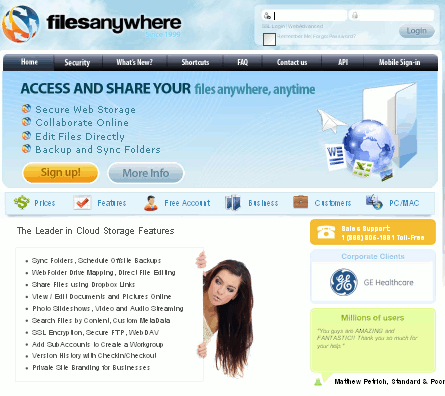Did you ever travel to a meeting with a prospective client and discover that you forgot to copy the file with your presentation to your notebook or to pack the CD or DVD?
Chances are good that you just answered that question with “yes”.
Nowadays it is rather simple to prevent something like that from happening. Just make sure your information is accessible in the cloud.
A service which I started using recently is
FilesAnywhere.
Check it out:
http://filesanywhere.com
Currently they offer
a free plan which gives you 1GB of storage.
By the way I wrote a note on my facebook page last year about how I have moved my entire email correspondence to Gmail:
Save Your Emails In The Cloud - Talking GMail
Talk to you later.
Yours
John W. Furst
Screen Dark, Data Lost?
Not For Me – Thanks to UPS
Did it ever happen to you? You are working on a complicated spreadsheet on your computer and all of a sudden… power is out. The screen gets dark, silence follows, and you might hear your neighbor through the wall shout out loud,
“Oh, shit!”
I got used to those power outages lasting from 30 seconds to 1 hour. Like during the recent heavy rainfalls in early December. In 95% of all cases power comes back in less than 5 minutes.
- Other people suffer data loss.
- Some people even had their hard drives crash or other hardware damaged (Ouch!)
I am not one of them.
After moving to the Canaries I quickly realized that electric power is not as stable as in the big cities where I lived earlier.
Therefore, I got myself a UPS (uninterrupted power supply), a kind of a battery that keeps supplying your PC and monitor with juice even when power fails. Usually you can run up to 15 minutes on battery power with your normal PC or Mac setup.
The reason for writing this article is I want to share with you what I have learned about UPS during the last three years. I just replaced my UPS with a new one because the battery died.
Update: Just added a “How To Video” going through the process.
It's inside the blog post.
→ Continue reading:
What will you be doing, if your computer does not boot, your hard drive dies, or your DSL modem goes up in smoke? Can you continue to work? Will your business survive, if your office is flooded?
While most business owners are very aware and active about protecting and insuring their real estate and physical assets, they miss out having the same level of care for their virtual assets and productivity tools, which is the data and applications needed to run their business.
Here are a few
“sharp” bullets to think about, some minimum requirements.
- You will need UPS (Uninterruptible Power Supply) for your desktop/server computer(s) and everything that is connected to it. It's like the battery in your notebook. Just a bit bigger. It also protects your hardware from power surges through lightening.
- Have two computers setup and ready to work on. Have spares for your staff
- Have your current data on at least two computers, media, and locations.
E.g. Online storage accessed from an Internet Cafe could be one solution for a home-office guy, whose Internet line is down for days or his computers have been stolen.
- Use RAID (your data is on at least two hard-drives) for your desktop/servers. You want a second disk controller, too or true hardware RAID.
- Anti-Virus and malware protection.
- OS/Software Upgrade policy.
- Regularily “burn” data backups. I prefer DVD RAM, it behaves exactly like a hard-drive. On the road I use CD-RW or an USB stick. Offline-Backups are not only for disaster recovery. They are also good for files that you have deleted too quickly!
- Don't forget about system/configuration data.
- Have local backups of your online services, like blog database, ...
- When using online storage or an online Email archive syndicate with your local computer. Don't forget: Two different places, two media, two computers. You don't want to rely on your Internet connectivity as well.
- TEST your backup strategy.
- Verify your backup. Randomly check every backup. Sometimes do a full verification.
Many people waste time doing backup to find out that they are worthless later on. I remember a corporate client, who did backups to tape daily, but none of them was good for a consecutive period of half a year. Till I told them.
Combine those bullets into something that works for you. But keep in mind:
“Simply do not rely on a single point of failure!”
You should setup a process that let's you forget about this stuff otherwise it will become a huge productivity killer in no time. Specific advice needs to be tailored to your work habits and your business. It might be smart to hire a consultant for setting up those procedures, recommending software, etc. Especially, when you're business is already off the ground, but you never thought about this topic.
Otherwise, expand it as you grow.
Some advanced issues you can think about:
- Categorize data according to importance need for online availability. This will reduce the requirements for a backup plan and has your productivity in mind. You won't need XX% of the data you have stored, again. Might be the famous 80% (Pareto principle 80/20 rule).
- Encryption and data security. Some critical data should be encrypted on the storage medium!
- Support for cooperative work
- Legal requirements for storing financial data, emails, customer data, ...
Thanks to
Pat Doyle, who inspired me to write about this subject with her post, “Declare Independence From Your Computer”
Yours
John W Furst





